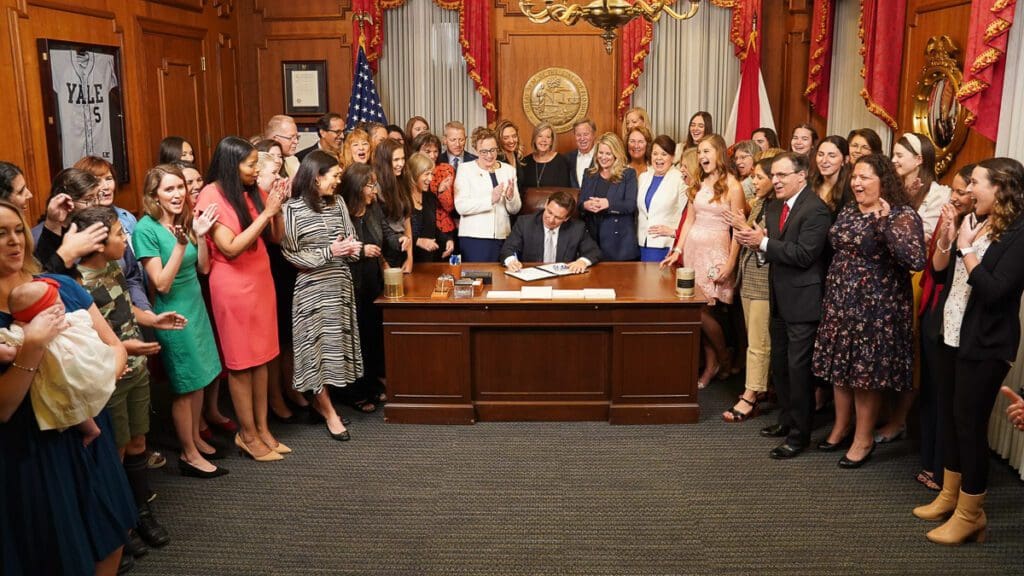Florida as a regional safe haven for women to seek abortion will end on Wednesday when a new six-week ban goes into effect. Meanwhile, some on the other side of the issue are ramping up efforts to promote adoption as an alternative.
Opponents of the new law — passed by the Republican-controlled Legislature — say most women don’t even know they are pregnant at six weeks. The ban also requires a 24-hour delay period and that patients have two in-person appointments to get abortion care.
“It’s totally against all reproductive rights and the ability to get the kind of health care that women deserve, regardless of what their reason is for getting an abortion,” said Jane Torres, a women’s rights advocate on Key Biscayne.

The closest option for Floridians is North Carolina, which allows abortions up to 12 weeks. However, North Carolina is impractical for many women because it requires a 72-hour waiting period.
“So you’re talking about tens of thousands of Floridians who will likely have to travel hundreds if not thousands of miles to another state for abortion access,” said Michelle Quesada, spokeswoman for Planned Parenthood of South, East and North Florida, which has eight clinics in its region.
The six-week ban will further chill doctors from performing emergency surgeries on pregnant women even when their lives are in danger, Quesada said. This was already occurring with the 15-week ban with examples making national headlines, such as the Miramar woman whose water broke and who had to miscarry in a bathroom of a hair salon after being denied care.
“These bans disproportionately impact marginalized communities, which is where the majority of patients come to us for abortion care. Most of them already have children at home,” she said.
See: Interactive Map: U.S. Abortion Policies and Access After Roe
After the U.S. Supreme Court overturned Roe v. Wade in June 2022, Florida lawmakers passed a 15-week abortion ban in 2022, but surrounding states adopted stricter measures. That meant Florida became a regional destination for the procedure and the number of abortions increased to 84,000 last year, according to the Agency for Healthcare Administration.
Gov. Ron DeSantis, then running for president, got behind the six-week abortion ban. He signed it into law in April.
The Florida Supreme Court paved the way for the law to come into force earlier this month when it ruled abortion is not a privacy right under Florida’s Constitution. But on the same day, the court OK’d a November ballot measure that reproductive health advocates pin their hopes on.
Democrats and women’s health care advocates say they will use Wednesday to galvanize voters.
Vice President Kamala Harris plans an appearance Wednesday in Jacksonville.
Planned Parenthood of South, East and North Florida will hold a news conference at 10 a.m. on Wednesday at the Golden Glades Health Center in Miami.
Debbie Mucarsel-Powell, the Democrat running against U.S. Sen. Rick Scott, is holding a news conference at the Government Center in downtown Miami at 1:30 p.m.

Many of the proponents of Florida’a new 6-week ban were silent on the issue. DeSantis issued no statement and the sponsors in the Legislature – Sen. Erin Grail, R-Fort Pierce and Rep. Jennifer Canady, R-Lakeland – did not return calls or emails for comment.
Glenda Richardson Carr, founder and CEO of Bundle Hope Adoption Family Services in North Florida, told NPR that she supports the ban. “I have no doubt that we could take every birth mom that would like to place a child for adoption and find them a family,”
Abortion rights groups are raising funds to pay for travel expenses for Florida women who have to go to other states for abortions.
“There’s a lot of confusion and chaos over the last couple of weeks as we are entering this new reality,” Ramos said. “Our costs will double or triple. People are angry, though, and are coming to us saying, “How can we help?’” said Rebecca Ramos, treasurer for the Women’s Emergency Network in Miami.
JOHN PACENTI is a correspondent of the Key Biscayne Independent. John has worked for The Associated Press, the Palm Beach Post, Daily Business Review, and WPTV-TV.




